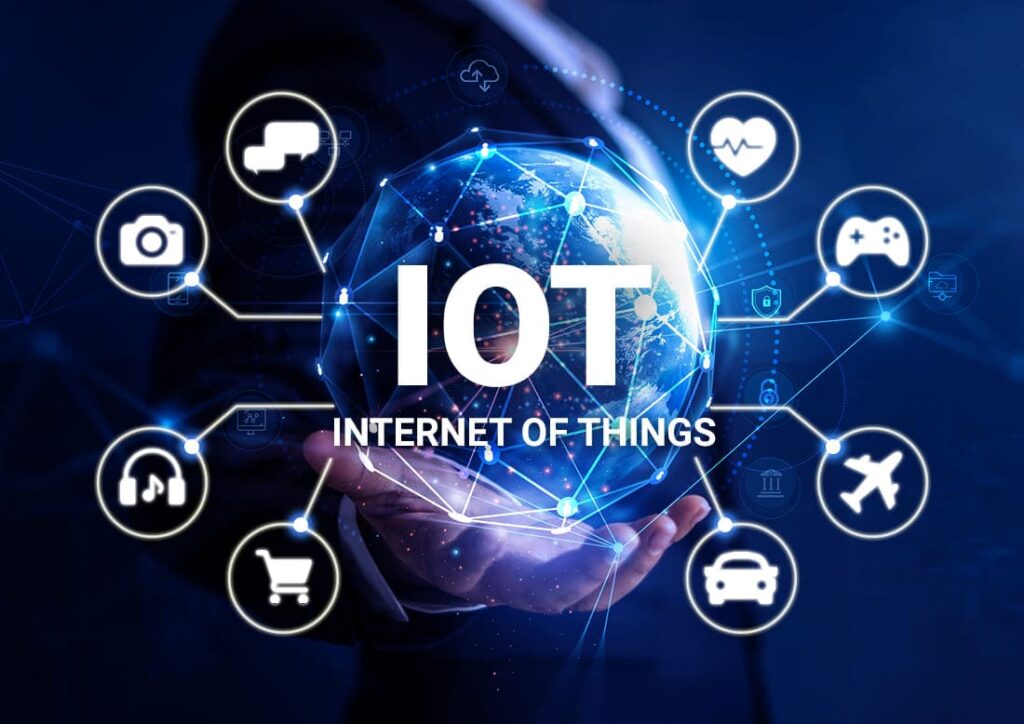
In an world dominated by digital transformation & technological advancements, the Internet of Things has emerged as a revolutionary force, reshaping the way we live and work. This blog aims to unravel the significance of IoT, exploring its importance, underlying technologies, industrial applications, and the myriad ways it unlocks business value across diverse industries.
Internet of Things refers to a network of everyday objects embedded with sensors, software, and other technologies, enabling them to connect, share data, and communicate through the Internet. These smart devices, ranging from household appliances and wearable gadgets to industrial machinery, work collectively to gather, analyze, and exchange data, ultimately enhancing efficiency, automation, and convenience in various aspects of our daily lives and industries.
The Internet of Things (IoT) is a concept that links everyday objects to the internet, allowing them to exchange data. This connectivity transforms ordinary devices into intelligent, data-driven entities, fostering unprecedented levels of efficiency, automation, and innovation. IoT is crucial for a variety of reasons:
1. Enhanced Efficiency
IoT streamlines processes, reducing manual intervention and improving operational efficiency.
2. Real-time Insights
Connected devices generate vast amounts of data, providing real-time insights for informed decision-making.
3. Cost Savings
Automated processes and predictive maintenance lead to cost reductions, optimizing resource utilization.
4. Improved Quality of Life
In the consumer space, IoT enhances convenience, safety, and overall quality of life through smart homes and wearable devices.
Several technologies have paved the way for the proliferation of IoT:
1. Wireless Connectivity
Technologies like Wi-Fi, Bluetooth, and cellular networks enable seamless communication between devices.
2. Sensors
IoT relies on a variety of sensors, such as temperature sensors, motion sensors, and cameras, to collect and transmit data.
3. Cloud Computing
Cloud platforms store and process the massive volumes of data generated by IoT devices, facilitating scalability and accessibility.
4. Edge Computing
Handling data nearer to its origin (at the edge) decreases delays and boosts the effectiveness of IoT systems.
5. Machine Learning and Artificial Intelligence
These technologies enable IoT devices to analyze and learn from data, making them smarter and more adaptive over time.
Industrial IoT (IIoT) extends the concept of IoT to the industrial sector, connecting machinery, sensors, and systems to enhance manufacturing and industrial processes. IIoT facilitates predictive maintenance, improves operational efficiency, and enables the creation of smart factories.
Numerous industries stand to benefit from the implementation of IoT:
The applications of IoT are vast and diverse, spanning various industries and use cases:
The Internet of Things has become an integral part of our interconnected world, reshaping industries and enhancing the way we live and work. With its potential to unlock business value, improve efficiency, and drive innovation, IoT continues to play a crucial role in the digital revolution. In navigating this ever-changing landscape, embracing the potential of connectivity isn’t merely an option – it’s a strategic necessity for organizations aiming to flourish in the digital age.

1260 Centennial Ave, Suite 1A,
Piscataway NJ 08854
Email Us:
info@emonics.com
Call Us :
Useful Links Submit a Resume Trademarks & Legal Statement Privacy Policy Site Pages Site Search